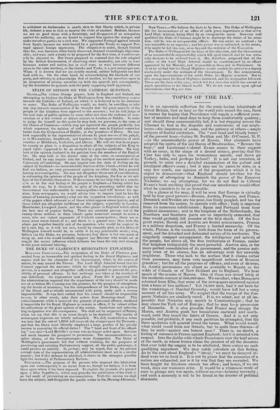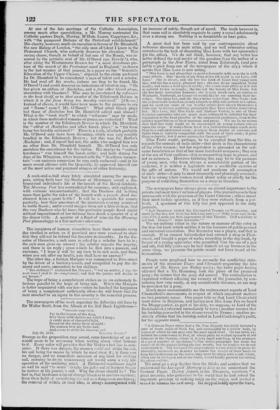TOPICS OF THE DAY.
IT is an agreeable reflection for the panic-loving inhabitants of Great Britain, that so long as the world rolls round the sun, there is reason for hoping that Providence will supply a sufficient num- ber of murders and mad dogs to keep them comfortably quaking ; and should these unaccountably fail, it is but stepping across the Channel to find in the disputes and contentions of our neigh- boursâthe impotency of some, and the potency of othersâample subjects of fearful excitation. The " raw head and bloody bones' of the present hourâhating St. Swithin and Mr. O'Connel, M. P. âis the uncontrollable power of Russia. Our alarmists have adopted the motto of the old Baron of Bradwardine, " Beware the bear ;" and Lieutenant-Colonel Evans comes to their support with an essay, in the shape of a decent octavo, proving that the Czar has only to open his tremendous mouth, and down go Turkey, India, and perhaps Ireland! It is not our intention, at present, to enter into a detailed examination of the gallant and intelligent officer's essay ; but it may not be amiss to state, in a very few words, our opinion of the proposition which it is his object to demonstrateâthat England should interfere for the purpose of attempting to diminish the power of the Emperor Nicholas ; we say attempting, for we do not find in Colonel Evans's book anything like proof that our interference would effect what he considers to be so desirable.
On a glance at the map, it will be seen that Europe is virtually held by four great powersâRussia, Austria, Prussia, and France. Denmark and Sweden are too poor, too thinly peopled, and too far removed from the centre, to operate with effect ; Italy is impotent from its numerous subdivisions ; Spain and Portugal from their political dissensions ; and in the kingdom of the Netherlands, the Northern and Southern parts are so imperfectly cemented, that they would probably fall asunder at the first shock. Of the four great states, Russia and Austria are feudal aristocracies, Prussia is a military despotism, and France a limited monarchy. Of the whole, Prussia is the weakest, both from the form of its govern- ment, and the detached and dislocated nature of its territories. The singularly compact arrangement, the intelligence and activity of the people, but above all, the free institutions of France, render that kingdom indisputably the most powerful. Austria also, in the more perfect consolidation of its government, and the greater anti- quity even of its abuses, has an advantage over her unwieldy neighbour. Those who look to the surface that it claims rather than possesses, may form very magnificent notions of Russian grandeur ; but for all the purposes of offence, and even of defence, its Asiatic possessions are about as available to Russia as the wilds of Canada or of New Holland are to England. We hear much of the armies of Russia. One of them was stated lately at the moderate amount of 300,000 men. We recollect, when Bonaparte returned from Elba, that some of the newspapers mustered against him a force of two millions! Yet 70,000 men, had it not been for the wanderings of Marshal Grouchy, would have left but a sorry account of all this array. We suspect that the troops of the Em- peror Nicholas are similarly rated. It is, we admit, not at all im- possible that Nicholas may march to Constantinople ; that he may chase the Turk out of Europe ; that he may keep possession of Roumelia. It is also possible that France may occupy the Morea, and Austria push her boundaries eastward and south- ward, until they touch the limits of Greece. And it is not only possible, but probable, if any such partition be attempted, that the three spoliators will quarrel about the terms. What would result, what could result from our threats, but to unite three thievesâif they be suchâagainst one honest man ? There is, no doubt, a feeling of soreness in France against England ; but it is mingled with respect. Into the dislike with which Frenchmen view the barharians of the north, to whose frozen clime the greatest of all the disasters that ever befel the empire is to be attributed, there enters no such qualifying ingredient. We may safely calculate on this feeling. As to the cant about England's decay," we must be decayed in- deed were we to heed it. It is not by peace that the resources of a nation are exhausted, nor is it by war that they are recruited. We have fought for frivolous causes too often ; and hence, if we are weak, does our weakness arise. It would be a whimsical mode of cure to plunge into war again, without an oven\ helming necessity ; and such a necessity is not to be found in the dreams of political alarmists.
At one of the late meetings of the Catholic Association, among much other speechifying, a Mr. Murray contrasted the Catholic pastors Doyle, Murray, MâHale, Logan, Coppinger, &c., with "the pampered Bishops of the Protestant establishment." His charity, however, made an exception in favour of Dr. Blomfield, the new Bishop of London, "the only man of talent I know in the Protestant Church, who certainly deserves his elevation." This saving clause, though in behalf of but one of the Bench, was re- sented by the patriotic zeal of Mr. O'Dowd (qu. Dowdy ?), who, after citing the Westminster Review for "a most disastrous pic- ture of the march of the Protestant mind in England," as drawn in the last number of that journal, in a paper on the "Scientific Education of the Upper Classes," objected to the claim preferred for Dr. Blomfield to be considered a man of talent and a scholar. He had read all his works, (where are they to be found, Mr. O'Dowd ?) and could discover no indications of talent in any. "He has given an edition of aEschylus, and a few other Greek plays, abounding with blunders ! This may be ascertained by rojiTence to the book itself; or to that number of the Edinburgh Review in which it is fur from being too harshly criticised." [Cheers.] Instead of cheers, it would have been more to the purpose to cry out " Name ! name! Mr. O'Dowd." What other Greek plays but those of alaschylus has Dr. Blomfield edited and abused ? What is the "book itself" to which " reference " may be made, in which these maltreated remains of genius are embodied ? What is the number of the Edinburgh Review in which Dr. Blomfield, the " editor of IEschylus and other Greek plays," is " f'ar from being too harshly criticised ?" There is a book, of which probably Mr. O'Dowd may have been dreaming, which was very roughly handled in the Edinburgh Review ; but this was Dr. Butler's /Eschylus ; and, if report lied not, the critic who scalped him was no other than Dr. Blomfield himself. Mr. O'Dowd has only mistaken the executioner for the victim. His martyr to " critical harshness " was himself the harsh critic ; and both during the days of his Whiggism, when leagued with the "Northern tormen- tors"âan ominous connexion he very early eschewedâand in his more recent alliance with the Quarterly, he approved himself one of the most active and poignant stingers of either fraternity.



















 Previous page
Previous page